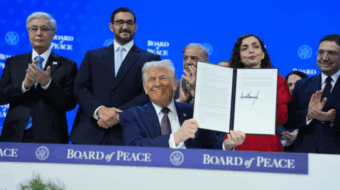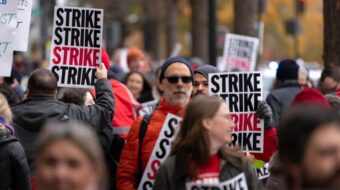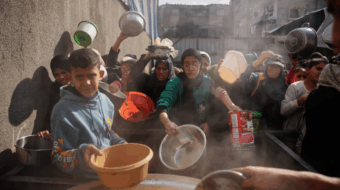On July 23 over 250 young people participating in the 3rd U.S.-Cuba Youth Exchange will begin their nine-day trip to Cuba, where they will meet Cuban youth and students and discuss many of the pressing issues of the day – issues like peace, education, health, culture, unemployment, racism and sexism.
The U.S.-Cuba Youth Exchange will bring together youth delegates from across the country. For many in the Youth United Delegation (YUD), one of the delegations going, this will be their first experience in Cuba. While travel to the socialist island nation is becoming more difficult in the face of the U.S. government’s increasing hostility, the Youth Exchange delegates will learn first hand what Cuban society is really like.
In a clear attempt to intimidate would-be travelers, the Bush administration, in March, ended the “people to people” educational licenses that allowed Americans to legally explore Cuba. Further, since Bush took office, over 1,200 Americans have received letters from the Treasury Department’s Office of Foreign Assets Control, threatening fines of up to $55,000 for violating the travel ban to the island. Last year 160,000 Americans had approval to visit Cuba, while 60,000 others went without government approval.
While the Bush administration pursues a policy of war rather than diplomatic and peaceful co-existence, the YUD, like its predecessors, is pursuing a policy dedicated to “people to people” diplomacy, exemplified by the multiracial, working -class delegation of U.S. youth and students. For YUD delegates like Julie Rodriguez from Los Angeles, “it is important that we continue to maintain relationships on a personal level despite the restrictions that the administration tries to impose.”
YUD coordinator Jessica Marshall said, “Many of the delegates want to go to Cuba because they don’t believe what Bush has said. … It is important for people to get first-hand impressions of Cuba, rather than the corporate media’s impression.” Rodriguez added, “they can’t even give us the truth about our own country, how do they expect to give us the truth about other countries?”
“U.S. policy towards Cuba is out-of-date. It is hurting the Cuban people,” said Molly Kelley, a delegate from Iowa and a leader of the Young Communist League. “The Cuban and American people should know a lot more about each other. It is a twenty-minute flight. Unfortunately most people only know what the media tells them.”
Opportunities for getting first-hand impressions will be abundant.
For example, delegates will visit the Latin American School of Medicine where delegates will visit the school. Here they will meet some of the students from all over Latin America and Africa who receive a free education in Cuba enabling them to return home and provide medical care.
Delegates will also discuss the Cuban educational system and the role of Cuban youth in literacy campaigns. Cuba has the highest number of teachers per capita in the world, and illiteracy has been practically eliminated. “It is cool that they have free education” said Tashia Holloman, a youth activist from Oakland. She added that the youth exchange would be a great way to “learn a lot about the Cuban people and their culture.”
Cuba’s accomplishments are even more remarkable in view of the U.S. government’s illegal blockade of Cuba, its continued efforts to sabotage Cuba’s economy, and its open support for right-wing terrorist attacks on Cuba from Miami.
Many of the delegates are already planning to get more involved in campaigns to end the blockade against Cuba. As Marshall noted, “This is a way for young people who are frustrated with Bush’s aggressive foreign policy and doctrine of pre-emptive war to speak out.” Noting the diversity of the delegation Alcy Montas, an activist from Uptown Youth for Peace and Justice, NYC said “we come from so many different backgrounds – dealing with police brutality, budget cuts, attacks on affirmative action, war and attacks on working people… that’s what makes us the most effective ambassadors for peace, and that’s why we’re going to Cuba.”
The author can be reached at tonypec@pww.org









